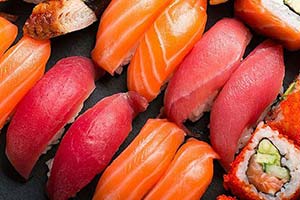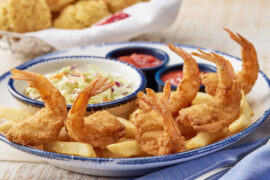Sushi restaurants and retail shops are allegedly regularly selling mislabeled fish to unwitting British consumers, according to an academic report. In cases cited in a new study to be published by the School of Environment & Life Sciences at the University of Salford in Manchester, customers thought they were buying fish sourced from the Atlantic Ocean when it was actually a tropical variety, while many fish were sold under a generic name that revealed little about where they came from. Some of the species were even classified as endangered.
 The findings suggest that an increasingly complex and globalized food supply chain is open to abuse, putting exotic species at risk.
The findings suggest that an increasingly complex and globalized food supply chain is open to abuse, putting exotic species at risk.
“This is about transparency,” said Professor Stefano Mariani, a conservation geneticist at Salford University, who, along with his colleague, Cristina di Muri, presented the study at the 50th Anniversary Symposium of the Fisheries Society of the British Isles at Exeter University.
Huge ‘Unassessed’ Trade
“People don’t know what they are buying. There is now a huge trade in lesser-known species that have not been assessed. We are talking about hundreds of species of fish. We found they are just not being correctly labeled. Imagine how impossible it is for a consumer to make an informed purchasing decision,” said Mariani.
The pair tested samples from grocery stores in Liverpool and Manchester, England. They found fish identified as red snapper, a tropical fish often used in Caribbean-style cooking, was actually redfish, a coldwater Atlantic species. Some labeled mackerel turned out to be either Indian mackerel, which is found in the Red Sea and Polynesia, or hilsa shad, a type of tropical herring mostly caught around the Indian and Arabian peninsulas.
Fish labeled as croaker, which is popular in African dishes, turned out to be any one of four varieties that come from waters as far away as Japan and Indonesia.
“With the croaker there are many species that have not been assessed for the level of stock,” Mariani said. “They could have come from a population that should not be harvested or from illegal fisheries. The suppliers are the main culprits because they know where the fish come from. The shopkeepers don’t have that knowledge. When asked about the types of fish they were selling, most had no detailed knowledge and just said they were selling ‘fish’.”
It was discovered that two markets in Manchester were selling parrotfish.
“We found fish we are used to seeing in aquariums or on reefs,” Di Muri said. “People will be surprised they are eating them. We don’t know about some of these fish species or the populations. As a consumer, you deserve to know what you are eating. Some of these species are not necessarily palatable.”
Mariani and Di Muri suggested that most of the samples identified in their study were unfamiliar to British diners because they had appeared only relatively recently in the UK market, largely because of the growing number of shops catering to different ethnic groups.
A separate study of sushi bars conducted by Mariani found that about 10% of fish sold had been substituted for another species. In addition, critically endangered species of tuna and eel were being sold without customers being told that they were at risk.
“If you just lump fish under some vague term you’re not going to do much to help the consumer know what they should consume or why they should choose certain fish over others,” Mariani said. “The supply chain is now so complicated. It starts in one corner of the world and spreads out across so many middlemen. There are so many opportunities for inaccuracy, bad translation and deliberate misreporting – all the way to the consumer’s plate.”
Part of the problem, Mariani suggested, is that British people know little about fish. A survey he conducted found the average British consumer could identify just two out of six common fish shown to them.
About half were familiar with salmon and mackerel, about one in three recognized cod, and less than one in five were able to identify sole, anchovy and sea bass.
Mislabeling of fish species is certainly not a problem in the UK alone, and may even be prevalent in North America.
Fish Fraud Knows No Boundaries
According to results from a separate study conducted by researchers at the University of California at Los Angeles (UCLA) and Loyola Marymount University, 47% of DNA-tested sushi ordered at 26 Los Angeles restaurants from 2012 through 2015 was not correctly labeled.
The findings were publicized just as the outgoing Obama Administration was issuing new rules aimed at preventing unverifiable seafood from entering the United States market. Under the Seafood Import Monitoring Program, which went into effect on January 9, importers are required to report information and maintain detailed records about the harvest and chain of custody of fish they handle.
“DNA bar coding is becoming an increasingly popular tool to identify mislabeled products,” said LMU biology instructor Demian Willette, the report’s lead author who conducted the study with researchers from UCLA, UC Santa Cruz and UC Santa Barbara. “Our finding of a persistently high rate of seafood mislabeling should encourage consumers to demand strong truth-in-menu laws from local public health agencies.”
“The good news is that sushi represented as tuna was almost always tuna,” Alison Hewitt, senior media relations officer at UCLA, posted at the www.ioes.ucla.edu website. “Salmon was mislabeled only about one in 10 times. But out of 43 orders of halibut and 32 orders of red snapper, DNA tests showed the researchers were always served a different kind of fish. A one-year sampling of high-end grocery stores found similar mislabeling rates, suggesting the bait-and-switch may occur earlier in the supply chain than the point of sale to consumers.”
“Half of what we’re buying isn’t what we think it is,” said Paul Barber, a UCLA professor of ecology and evolutionary biology and senior author of the study that has been published in the journal Conservation Biology. “Fish fraud could be accidental, but I suspect that in some cases the mislabeling is very much intentional, though it’s hard to know where in the supply chain it begins. I suspected we would find some mislabeling, but I didn’t think it would be as high as we found in some species.”
It’s not simply a matter of being annoyed that the wrong species of fish is on your plate. Such economic fraud undermines environmental regulations limiting overfishing, introduces unexpected health risks and interferes with consumers’ decisions, the researchers noted.





